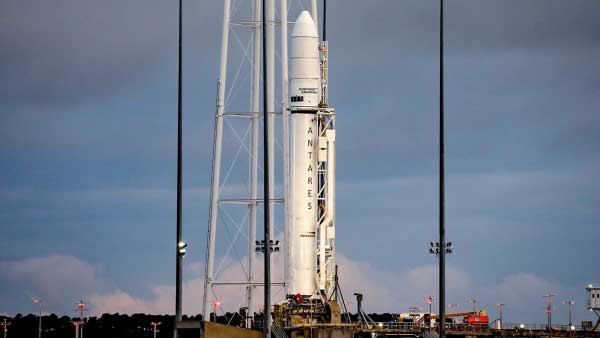KENNEDY SPACE CENTER, Fla., February 15, 2022 (Northrop Grumman PR) – Northrop Grumman will launch a variety of critical research and supplies on its upcoming 17th Commercial Resupply Services (CRS) mission to the International Space Station (ISS). The launch, which take place at NASA’s Wallops Flight Facility in Virginia, is scheduled for no earlier than February 19 at 12:40 p.m. ET.
The ISS National Laboratory is sponsoring more than 15 research and technology development payloads as part of this mission. These payloads, which represent diverse fields of study, intend to bring value to our nation through space-based research and enable a robust and sustainable market in low Earth orbit. Below highlights some of the ISS National Lab-sponsored investigations launching on Northrop Grumman CRS-17.
Last year, consumer goods company Colgate-Palmolive launched the first private-sector oral health care investigation to the ISS. Now, on this mission, the company’s skincare brand PCA Skin, will launch an investigation to collect data on the changes to skin health biomarkers that occur in the stressful environment of microgravity. Exposure to microgravity has been shown to cause skin to thin and become dry, mimicking the skin aging process on Earth. Results from this experiment could help better identify areas for early intervention in skin health and help guide the development of groundbreaking skin care innovations across all of Colgate-Palmolive’s skin care brands, such as PCA Skin, eltaMD, and Filorga.
MicroQuin is a Boston-based company launching an investigation evaluating 3D cell culture to characterize the three-dimensional development of breast and prostate tumor cell lines compared with healthy cells. In microgravity, cells form into 3D structures that more closely resemble cell growth and behavior in the human body. Results could help MicroQuin refine its cancer therapeutic and develop additional drugs for targeted treatment of breast and prostate cancer. This project originated from the Technology in Space Prize, an annual collaboration between Boeing and the Center for the Advancement of Science in Space to fund innovative startups through the MassChallenge Startup Accelerator.
The University of Notre Dame will launch a physical science investigation to better understand bubble dynamics on nanostructured surfaces. The project involves heating metal substrates with nanoparticle features submerged in a liquid and studying the resulting bubble dynamics. The research team will examine how the bubbles form, grow, and detach from surfaces that have different nanoscale features. In microgravity, where gravity-driven buoyancy is absent, the team can study these heat-generated bubbles in ways not possible on Earth. Results could lead to improved medical diagnostics and potential new methods for water purification.
These are just a few of the investigations sponsored by the ISS National Lab that are launching on this mission. To learn about all ISS National Lab-sponsored research launching on Northrop Grumman CRS-17, please visit our mission launch page.
About the International Space Station (ISS) National Laboratory
The International Space Station (ISS) is a one-of-a-kind laboratory that enables research and technology development not possible on Earth. As a public service enterprise, the ISS National Lab allows researchers to leverage this multiuser facility to improve life on Earth, mature space-based business models, advance science literacy in the future workforce, and expand a sustainable and scalable market in low Earth orbit. Through this orbiting national laboratory, research resources on the ISS are available to support non-NASA science, technology and education initiatives from U.S. government agencies, academic institutions, and the private sector. The Center for the Advancement of Science in Space, Inc. (CASIS) manages the ISS National Lab, under Cooperative Agreement with NASA, facilitating access to its permanent microgravity research environment, a powerful vantage point in low Earth orbit, and the extreme and varied conditions of space. To learn more about the ISS National Lab, visit www.ISSNationalLab.org.
